
An Essential Guide to Morgue Freezer Options and Features
Why Proper Body Preservation Matters in Modern Mortuaries
A morgue-freezer- is a specialized refrigeration unit designed to preserve human remains by maintaining precise low temperatures that slow decomposition and bacterial growth. These essential systems operate in two main temperature ranges: positive temperature units (2°C to 4°C) for short-term storage, and negative temperature units (-10°C to -20°C) for extended preservation.
Key morgue-freezer- specifications at a glance:
- Temperature ranges: 2°C to 4°C (positive) or -10°C to -20°C (negative)
- Capacity options: 1-8 bodies (cabinets) or 5-50 bodies (walk-in units)
- Main types: Walk-in rooms, cabinet units, mobile trailers, bariatric models
- Key features: Stainless steel construction, digital controls, backup alarms
- Applications: Hospitals, funeral homes, forensic labs, disaster response
The science behind preservation is straightforward. Cold temperatures dramatically slow enzymatic processes and inhibit bacterial growth - the two main drivers of decomposition. At 2°C to 4°C, bodies can be preserved for days or weeks. At freezing temperatures below -10°C, decomposition nearly stops entirely, allowing for extended storage when needed for forensic investigations or family arrangements.
This temperature control provides funeral directors with the flexibility to accommodate family schedules, coordinate with pathologists, and maintain dignity during the most sensitive times. Whether you're dealing with a single unexpected case or managing surge capacity during difficult periods, the right morgue-freezer- system becomes an essential tool for professional operations.
I'm Mortuary Cooler, a national-level mortuary cooler supplier with extensive experience helping funeral facilities select and install the right morgue-freezer- solutions for their specific needs. My background includes working with facilities across the United States to ensure they have reliable, properly-sized refrigeration systems that meet both regulatory requirements and operational demands.
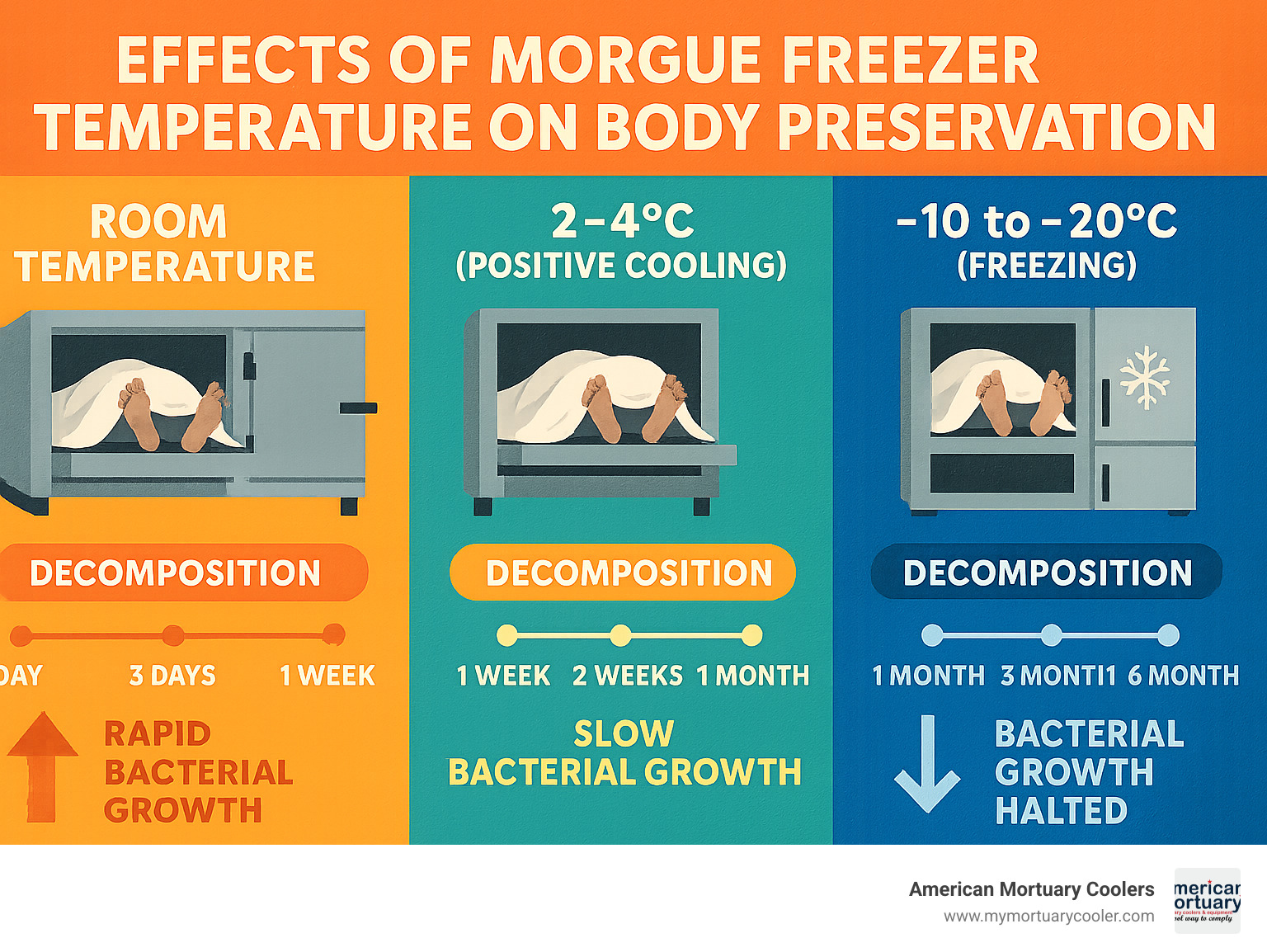
Morgue-freezer- further reading:
What Is a morgue-freezer- and Why Temperature Matters
Think of a morgue-freezer- as the guardian of dignity during life's most difficult moments. These aren't your typical commercial refrigerators - they're precision-engineered systems built specifically to preserve human remains with the respect and care every family deserves.
The magic happens in the temperature control. While a regular fridge might fluctuate a few degrees without anyone noticing, morgue-freezer- units maintain exact temperatures that make all the difference between proper preservation and... well, let's just say you want to get this right.
Most facilities rely on positive temperature units that keep things between 2°C and 4°C (36°F to 39°F). This sweet spot gives you the preservation you need without freezing tissue, so bodies remain suitable for viewing and autopsy work. It's like hitting the pause button on natural processes - not stopping them completely, but slowing them down enough to give families time to make arrangements.
For longer-term storage or forensic cases, negative temperature units operate between -10°C and -20°C (14°F to -4°F). These essentially freeze time itself, preserving remains for months or even years. Scientific research on cold preservation shows just how effective proper temperature control can be - we're talking about extending preservation from hours to months.
How morgue-freezer- Slows Decomposition
Here's where science meets compassion. After death, your body's own enzymes start breaking down cellular structures - a process called autolysis. At room temperature, this happens fast. But drop that temperature down, and those enzymes practically take a nap.
At the same time, bacteria that cause decomposition love warm environments. They multiply like crazy at body temperature but become sluggish below 4°C. It's a double win - you're slowing both the internal breakdown and the bacterial party that nobody wants.
This temperature control becomes absolutely critical for autopsy scheduling. Pathologists need tissue integrity maintained for accurate examinations. Whether it's a routine case or a complex forensic investigation, your morgue-freezer- ensures that evidence stays viable for as long as needed.
Positive- vs. Negative-Temperature morgue-freezer-
Choosing between positive and negative temperature storage really comes down to what your facility handles day-to-day. Positive temperature units (2°C to 4°C) work beautifully for routine operations - hospitals, funeral homes, anywhere you need reliable short-term preservation. They use less energy, cost less upfront, and keep bodies in perfect condition for viewing and procedures.
Negative temperature units (-10°C to -20°C) are your specialty players. Forensic institutes love them for long-term evidence storage. Research facilities need them for extended preservation. They cost more to buy and run, but when you need to preserve remains for months or years, nothing else will do.
Most facilities start with positive temperature capacity for daily operations, then add negative temperature units as their needs grow. It's like building your preservation toolkit - you start with the essentials, then add the specialized equipment as your facility expands.
Main Types of morgue-freezer- for Every Facility
When it comes to choosing the right morgue-freezer-, there's truly a solution for every situation. Whether you're running a busy urban funeral home or managing a small rural facility, understanding your options helps you make the smart choice for your specific needs.
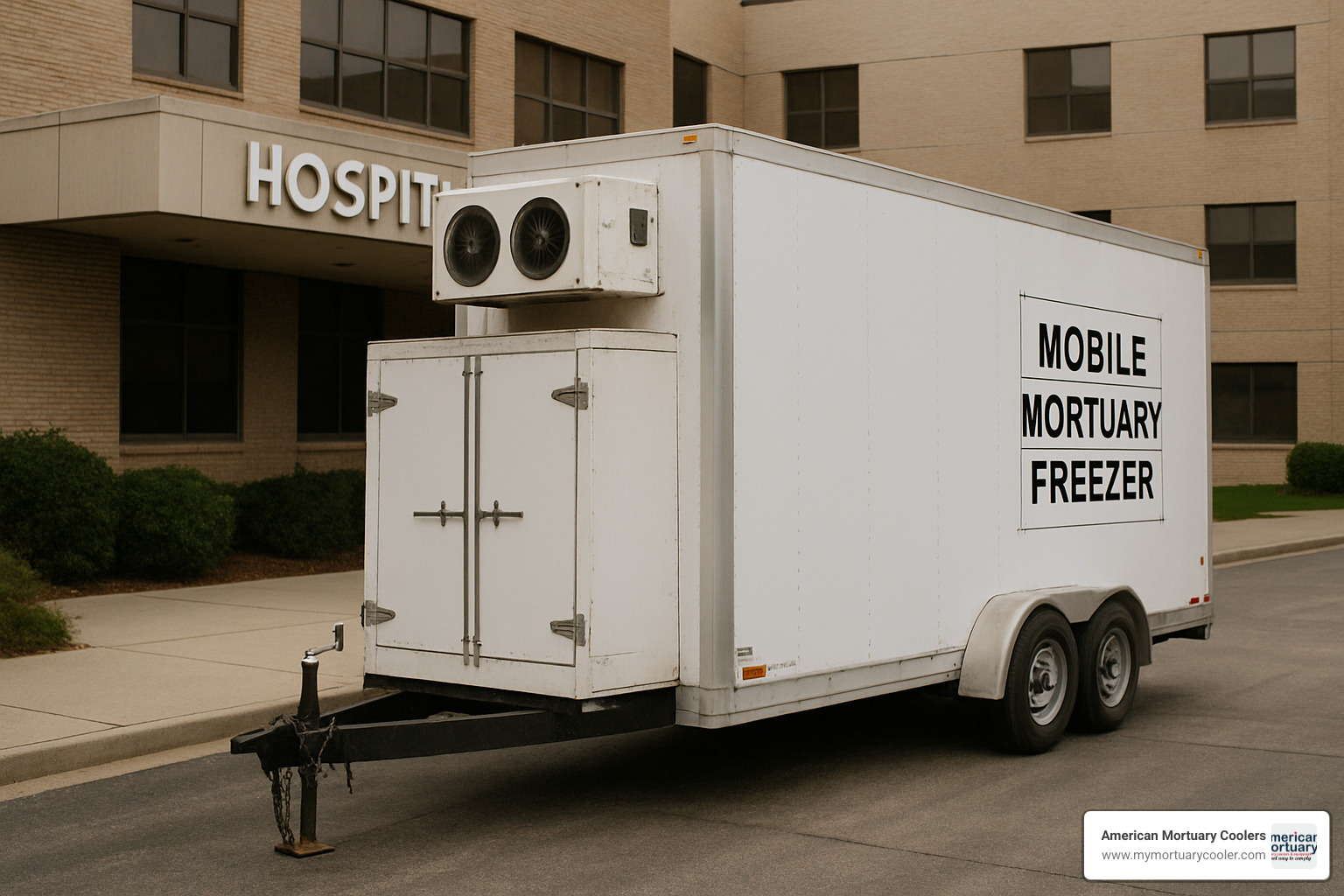
Walk-In Rooms for High Volume
If you're dealing with high volume, walk-in morgue-freezer- rooms are your best friend. These powerhouse systems can handle anywhere from 5 to 50 bodies using smart cantilever rack systems that make the most of every inch of space.
What makes these units special is their modular panel construction. Think of them like giant, precision-built puzzle pieces that fit together perfectly. Need to expand later? No problem. Moving to a new location? These panels can be taken apart and reassembled without losing their effectiveness.
The 4-inch thick insulated panels do the heavy lifting when it comes to energy efficiency. They're built with high R-values that keep your cooling costs reasonable, even when you're running a large installation. The cantilever storage racks are adjustable too, so you can configure them for different workflows and body sizes as your needs change.
Many facilities start with a smaller walk-in setup and add sections as they grow. It's like having a refrigeration system that grows with your business.
Compact Cabinets & Lockers
Not every facility needs walk-in capacity. Cabinet-style morgue-freezer- units are perfect for smaller operations or when you need reliable backup storage. These units typically handle 1 to 8 bodies in separate chambers, and here's the clever part - each chamber has its own independent refrigeration system.
This independent compressor design is brilliant for two reasons. First, if one unit has problems, the others keep working normally. Second, you can shut off empty chambers during slow periods, which saves energy and reduces wear on your equipment.
Hospitals love these cabinet systems because they fit well into existing morgue spaces and handle unpredictable caseloads beautifully. Each chamber trolley can safely hold up to 150 kg, and the stainless steel 304 construction means they'll last for years with proper care.
Mobile & Portable morgue-freezer-
Sometimes you need refrigeration where there isn't any infrastructure. That's where mobile morgue-freezer- units shine. These trailer-mounted systems are absolute lifesavers during disaster response, mass casualty events, or when you need temporary surge capacity.
Mobile units can preserve bodies for 6 to 72 hours depending on the model and conditions. They range from compact boxes that fit in standard vehicles to full trailer-mounted systems with walk-in capacity. Many include backup power systems, so they keep working even when the power grid doesn't.
For airports, railways, and military installations, having mobile units on standby provides immediate response capability. The ability to deploy refrigerated storage quickly can make all the difference between dignified handling and compromised conditions during critical situations.
Some portable units even feature pop-up tent configurations for field deployment, making them incredibly versatile for emergency response teams.
Bariatric & Oversized Solutions
Modern funeral service means accommodating everyone with equal dignity. Bariatric morgue-freezer- solutions feature extra-wide doors, reinforced trolley systems rated for 1000+ pounds, and specialized lifting equipment that protects your staff from injury.
These specialized chambers are built wider and longer than standard units, with reinforced flooring and improved structural support throughout. The refrigeration systems are also upgraded to handle the additional thermal mass while maintaining consistent temperature control.
The mechanical upgrades in bariatric units ensure that temperature remains stable even with the larger thermal load, so preservation quality never gets compromised regardless of the individual's size.
Key Features, Technologies, and Innovations
Today's morgue-freezer- systems would amaze anyone who worked with older models just ten years ago. The technology leap has been remarkable, bringing us everything from smartphone alerts when temperatures drift to surfaces that actually fight bacteria on their own.
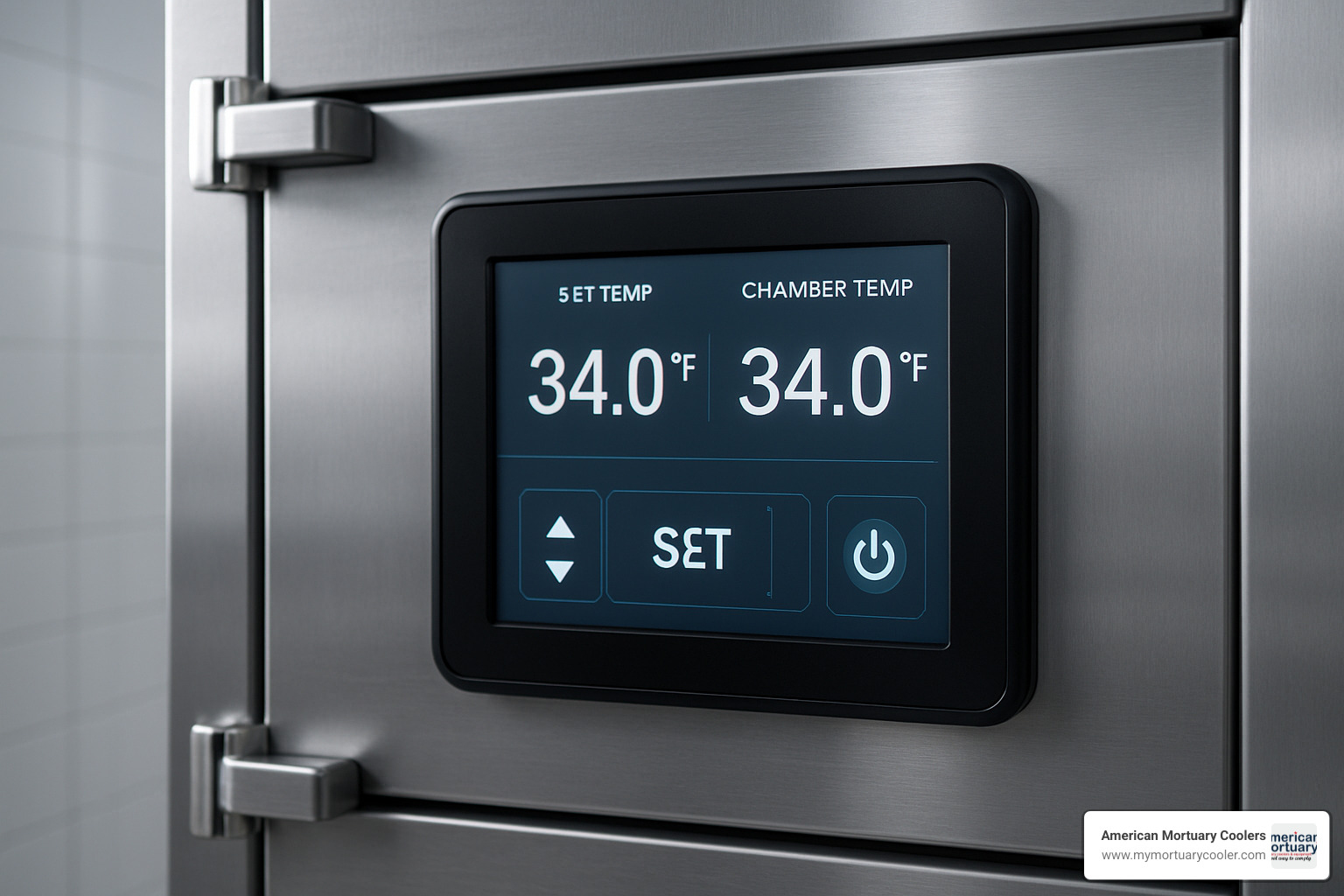
The foundation of any quality morgue-freezer- starts with stainless steel 304 construction. This isn't just about looks - this grade of steel resists corrosion even after years of cleaning with harsh disinfectants. The walls use high-density polyurethane foam insulation that keeps temperatures stable while staying environmentally friendly.
But here's where things get really impressive: digital PID controllers now maintain temperatures within just ±1°C, and some premium systems hit ±0.1°C precision. That's the kind of accuracy that would have required laboratory-grade equipment not too long ago.
Modern alarm systems go way beyond a simple beep when something goes wrong. You'll get audio and visual alerts for temperature problems, power outages, and even doors left open too long. Many units include UPS backup power systems and cellular connections for remote monitoring. Latest research on refrigeration efficiency shows these smart systems can cut energy use by up to 30% compared to older models.
Safety & Hygiene Considerations
Safety in modern morgue-freezer- design goes far beyond keeping things cold. Every surface that matters carries NSF approval, meeting the strictest sanitation standards in the industry. OSHA-compliant safety release handles on every door mean anyone can get out quickly in an emergency - a feature that hopefully never gets used but provides essential peace of mind.
The interior surfaces deserve special attention. Seamless fiberglass construction eliminates every crack and crevice where bacteria might hide. Vapor-proof LED lighting gives you excellent visibility without adding heat that could mess with your temperature control. Door gaskets use advanced materials that keep sealing properly even after thousands of opening cycles.
The newest innovation might be antimicrobial surface treatments that actively fight bacterial growth. These aren't just coatings that wear off - they're built into the surface material and keep working for years. It's like having an extra layer of protection working around the clock, even between your regular cleaning schedules.
Smart Temperature Control & Redundancy
Individual chamber control systems represent one of the biggest advances in morgue-freezer- reliability. Each storage space operates independently, so if one compressor has issues, the rest keep working normally. This design also lets you shut off unused chambers during quiet periods, saving energy when you don't need full capacity.
Remote monitoring has become incredibly sophisticated. Smartphone apps can alert facility managers to problems even when they're at home or traveling. Data logging systems automatically maintain detailed temperature records for regulatory compliance and quality assurance. Some systems even integrate with facility management software to track occupancy and optimize workflows.
More info about Sustainability Trends shows how manufacturers are incorporating eco-friendly refrigerants and energy recovery systems. These innovations minimize environmental impact while actually improving performance standards.
Energy Efficiency & Maintenance
High R-value insulation panels and low-ambient controls ensure your system works reliably even in challenging conditions. Automatic defrost cycles prevent ice buildup that could hurt efficiency, while variable-speed compressors adjust their output based on actual cooling needs rather than running full-blast all the time.
Modern systems include diagnostic capabilities that can actually predict when components might fail. This means you can schedule maintenance during convenient times rather than dealing with emergency breakdowns. Most facilities follow quarterly cleaning schedules, annual calibration, and biannual compressor service.
The energy savings from modern morgue-freezer- designs can reduce your operating costs by 40-50% compared to older systems. When you factor in the improved reliability and reduced maintenance headaches, upgrading to modern technology often pays for itself faster than you might expect.
Selecting, Installing & Maintaining Your morgue-freezer-
Choosing the right morgue-freezer- system can feel overwhelming at first, but breaking it down into manageable steps makes the process much more straightforward. Think of it like buying a car - you need to know how you'll use it, where it'll go, and what features matter most to your daily operations.
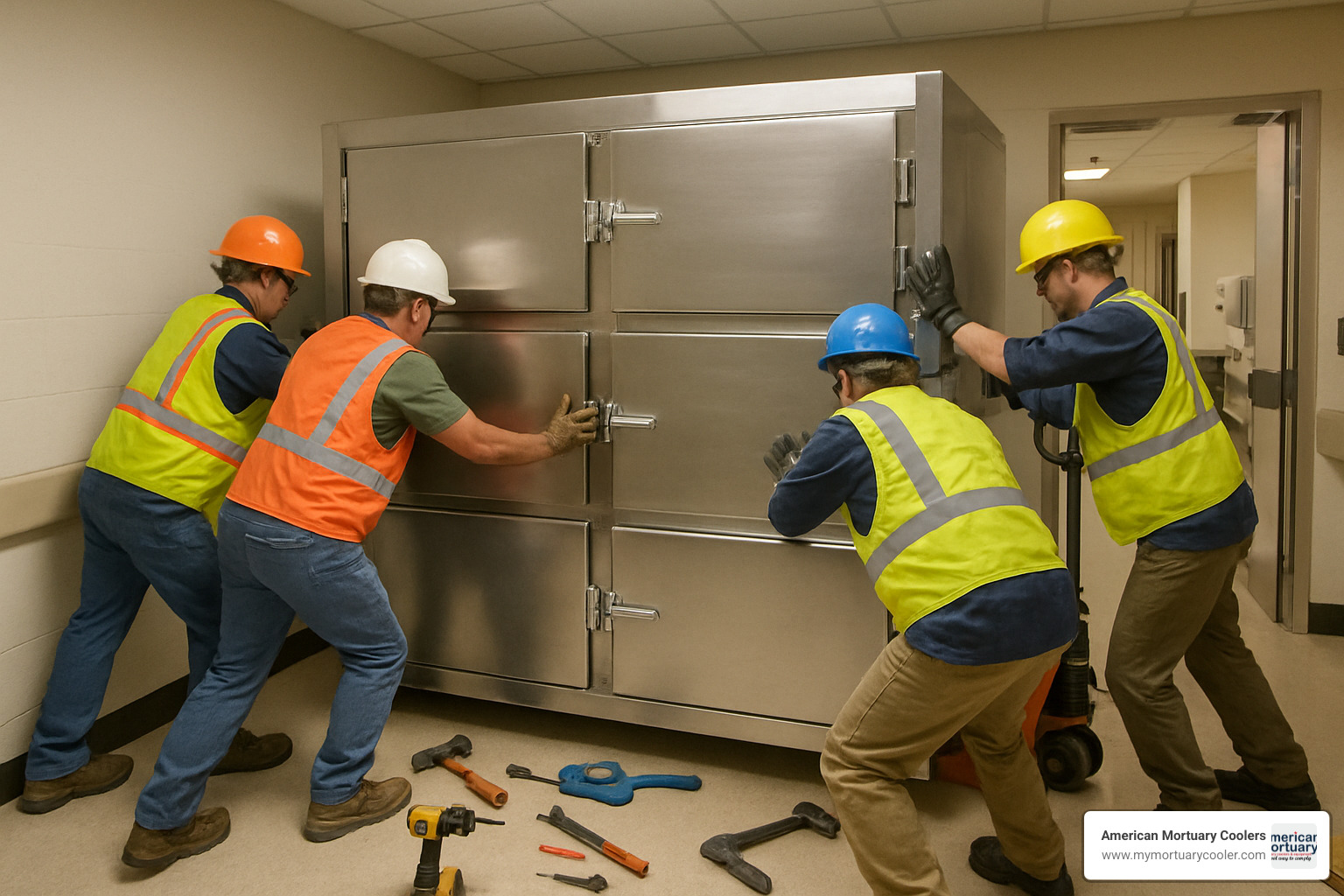
Start by honestly assessing your average caseload and peak capacity needs. Don't just think about this month - consider seasonal variations, potential growth, and those unexpected busy periods that every facility experiences. It's often smarter to invest in slightly more capacity upfront than to scramble for additional units later when you're already stretched thin.
Regulatory compliance isn't optional, but it doesn't have to be intimidating either. OSHA requirements focus on keeping your staff safe with features like emergency release handles and proper electrical installations. NSF standards ensure your unit meets strict sanitation requirements. ISO certifications verify quality management systems. Your local health department may have additional requirements, so check with them early in the process.
Site preparation deserves careful attention before your morgue-freezer- arrives. You'll need adequate electrical service to handle the refrigeration load, proper drainage for condensate, and enough clearance around the unit for service access. For walk-in systems, delivery can get interesting - sometimes doors or windows need temporary removal to get large units into position.
Step-by-Step Purchase Checklist
Your budget planning should include more than just the sticker price. Factor in installation costs, ongoing energy expenses, maintenance agreements, and warranty coverage. A slightly more expensive unit with better energy efficiency often pays for itself over time.
Space requirements go beyond just fitting the unit in your room. Consider ceiling height, door access for both installation and daily use, and future expansion possibilities. Nothing's more frustrating than finding the perfect unit only to find it won't fit through your doorway.
Technical specifications need to match your actual needs. Positive temperature units (2°C to 4°C) work great for routine operations, while negative temperature systems (-10°C to -20°C) serve forensic and long-term storage needs. Don't forget about power requirements - voltage, amperage, and phase specifications must match your facility's electrical service.
For detailed guidance on each of these considerations, check out our Ultimate Checklist that walks through every decision point.
Best Practices for Operation & Upkeep
Once your morgue-freezer- is installed, proper operation starts with comprehensive staff training. Everyone who'll use the system needs to understand temperature monitoring, alarm responses, and emergency procedures. This isn't just about compliance - it's about maintaining the dignity and integrity of those in your care.
Daily temperature logs remain essential even with digital systems. Modern units can automate much of this record-keeping and provide real-time alerts, but having staff actively check and document temperatures ensures problems get caught quickly. These logs also prove invaluable for regulatory inspections and quality assurance reviews.
Annual calibration of temperature sensors keeps your system accurate over time. Most manufacturers recommend professional calibration, though some newer units include self-calibrating sensors that maintain accuracy automatically. Don't skip this step - temperature accuracy is literally the foundation of everything your morgue-freezer- does.
Monthly gasket inspections take just a few minutes but prevent major problems. Look for tears, compression loss, or contamination that could compromise sealing. Gaskets are inexpensive to replace but absolutely critical for maintaining temperature stability and energy efficiency.
Professional compressor service typically happens annually or bi-annually depending on your usage patterns. This includes checking refrigerant levels, inspecting electrical connections, and cleaning condenser coils. It's like getting your car serviced - a small investment that prevents much larger problems down the road.
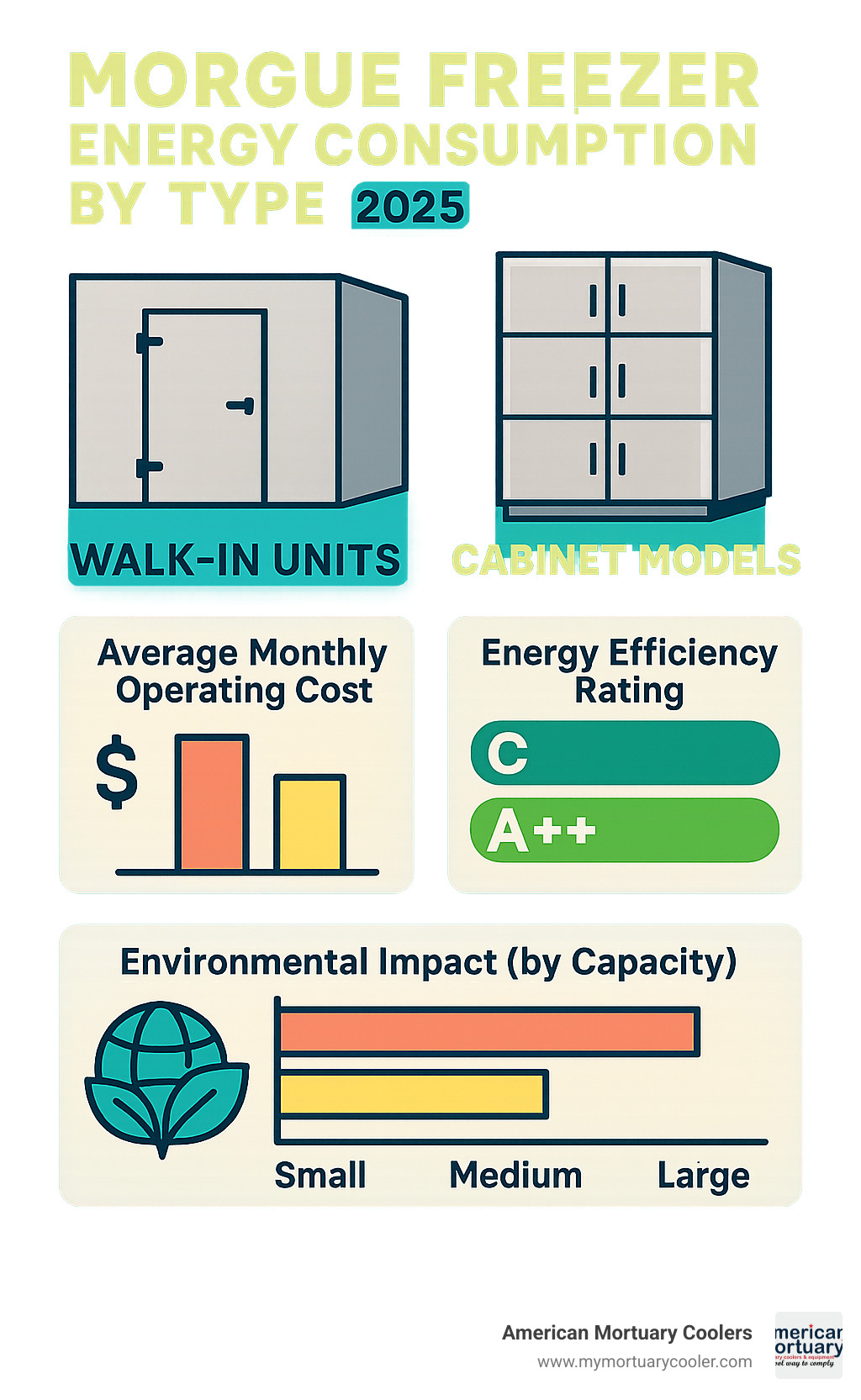
Frequently Asked Questions about morgue-freezer-
When you're investing in a morgue-freezer- system, certain questions come up again and again. I've worked with hundreds of facilities over the years, and these are the concerns that keep funeral directors up at night. Let me share the practical answers that matter most for your day-to-day operations.
How cold should a morgue-freezer- be set?
The temperature you choose makes all the difference between proper preservation and costly problems down the road. For your everyday funeral home operations, set your morgue-freezer- between 2°C and 4°C (36°F to 39°F). This sweet spot gives you the preservation you need while keeping tissue in perfect condition for viewings and autopsy work.
Think of it this way - you want cold enough to slow down decomposition significantly, but not so cold that you freeze the tissue solid. At these temperatures, you're buying yourself weeks of storage time instead of just days.
Now, if you're dealing with forensic cases or need extended storage for months at a time, that's when you drop down to the negative temperature range of -10°C to -20°C (14°F to -4°F). This essentially puts decomposition on pause, but remember - once frozen, the tissue needs to be thawed before examination.
Here's something many people don't realize: temperature accuracy matters more than you might think. Keep your settings within ±1°C for the best results. Modern digital controllers make this easy, but if you're still running an older mechanical system, those temperature swings could be compromising your preservation quality without you even knowing it.
Can a morgue-freezer- be expanded later?
This is one of my favorite questions because the answer is usually yes, and it can save you a lot of headaches down the road. Most modern morgue-freezer- systems are built with growth in mind - we've all learned that funeral homes rarely get smaller over time.
Walk-in units are the expansion champions here. They use modular panel construction that's almost like building blocks for adults. Need more space next year? We can add another section using the same prefabricated panels. Need to move your entire operation to a new building? Those panels come apart and go back together at the new location without any drama.
Cabinet systems work a bit differently for expansion. You're typically adding more units rather than making existing ones bigger, which means you need to plan for adequate floor space and electrical capacity from the start. Some manufacturers offer modular cabinet systems that connect together for centralized monitoring, which gives you that unified control even as you grow.
Here's my professional advice: plan for expansion during your initial installation. It's so much cheaper and easier to oversize your electrical service and leave space for additional panels now than to retrofit later. I've seen too many facilities paint themselves into corners because they only planned for today's needs.
What options exist for temporary surge capacity?
Nobody likes to think about it, but sometimes you need storage capacity fast - whether it's a mass casualty event, equipment failure, or just an unexpectedly busy period. The good news is there are several practical solutions that can have you covered quickly.
Mobile morgue-freezer- units are your first line of defense for surge situations. These trailer-mounted systems can be at your facility within hours and provide immediate additional capacity. You don't need permanent installation - just adequate electrical service and a level spot to park. Many facilities rent these for short-term deployment during facility maintenance or unexpected events.
Portable body storage units offer another quick solution when you need just a few extra spaces. These compact units plug into standard electrical outlets and can be delivered and operational the same day. They're not as neat as your permanent installation, but they'll keep you running when every space counts.
Some of the smartest facility managers I work with maintain mutual aid agreements with nearby mortuaries. It's cost-effective backup that doesn't require you to maintain unused equipment year-round. When one facility gets overwhelmed, the others help carry the load. It's the kind of professional cooperation that makes our industry stronger.
The key is having these arrangements in place before you need them. Crisis is not the time to start shopping for emergency storage solutions.
Conclusion
Choosing the right morgue-freezer- system isn't just about temperature control - it's about providing dignity, reliability, and peace of mind when families need it most. The technology has come a long way from basic refrigeration units to sophisticated systems with smart monitoring, energy efficiency, and fail-safe redundancy.
Every facility faces unique challenges. A small funeral home might need a compact cabinet system that fits existing space constraints, while a major medical center requires walk-in capacity with surge capability for unexpected situations. The key is finding equipment that matches your specific operational needs while staying within budget.
American Mortuary Coolers understands these challenges because we've been helping facilities across the country solve them for years. Based in Tennessee, we specialize in crafting custom mortuary coolers custom to your exact requirements. Whether you're dealing with space limitations, special capacity needs, or unique regulatory requirements, we build solutions that work for your situation.
Our direct delivery service covers all 48 contiguous states, bringing the same quality and support to facilities from coast to coast. We've installed systems in the Northeast's busy urban hospitals, the Southeast's traditional funeral homes, Midwest medical centers, Southwest border facilities, Rocky Mountain rural operations, and Pacific coast institutions. Each installation teaches us something new about what works in real-world conditions.
The investment in a quality morgue-freezer- system pays for itself through improved operational efficiency, lower energy costs, and reduced maintenance headaches. Modern systems come with 15-year panel warranties and 5-year mechanical warranties, giving you confidence in long-term reliability. When you factor in energy savings of 30-50% compared to older systems, the numbers make sense even for budget-conscious facilities.
Technology continues advancing rapidly in this field. The Complete Guide to Freezer Morgue Options explores emerging trends like IoT integration, predictive maintenance, and sustainable refrigerants that will shape the next generation of mortuary equipment.
Ready to explore custom solutions for your facility? Contact American Mortuary Coolers today to discuss your requirements with our experienced team. We'll help you steer the selection process, ensure proper installation, and provide ongoing support to keep your system running smoothly for years to come. Because when families are counting on you, your equipment needs to be absolutely reliable.



